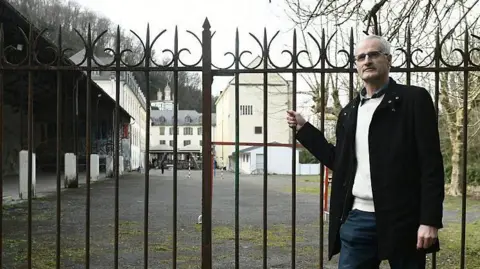 AFP
AFPFrench Prime Minister François Bayrou said that the revelation of her eldest daughter that she was among the children who had been mistreated in a Roman Catholic school “the dagger in the heart as a father”.
Hélène Péllant, who is now 53, alleges that a priest of Notre-Dame de Bétharram beat her in a summer camp at the age of 14.
In recent weeks, details of physical and sexual abuses perpetrated during the decades in Betharram in the Pyrenees have drawn increasing attention to Bayrou, which was local Minister and Minister of Education at the time.
Bayrou, 73, denied suggestions that he knew students of mistreatment had suffered from the 1950s to 2010. He should appear next month before a parliamentary investigation.
The boarding school is located in his bastion in the southwest and he sent three of his children there.
Hélène Pelant was one of them, and in the last touch of the saga, she accused a priest at school of having beat her at the age of 14.
However, she was categorical, she had never spoken to her father of the incident, which took place in the 1980s.
“I stayed silent for 30 years. Apart from that, I didn’t mention it to anyone,” she said in an interview with Weekly Paris Match on Tuesday.
The priest, she said to the magazine, “caught me with the hair, dragged me on the ground for several meters, then hit me and kicked me everywhere, especially in the stomach,” she said the magazine.
“I get wet and stayed like that all night, wet and rolled in a ball in my sleeping bag,” she added.
Explaining why she had not talked about the experience, she said: “Betharram was organized as a sect or a totalitarian regime exercising psychological pressure on students and teachers, so they remained silent.”
Notre -Dame de Bétharram – which was renamed The beautiful branch (La Belle Branche) In 2009 – is a primary and secondary school about 25 km (15 miles) from Pau, a city of Bayrou has led as mayor since 2014.
The school is also found in the constituency that Bayrou was represented as a deputy of the 1980s in the 2010s.
A number of allegations of abuse committed by priests and staff surfaced in the 1990s.
But in 1996, an investigation by the French Ministry of Education concluded that “Notre-Dame de Bétharram is not a school where students are brutalized”.
Later, a former head of the school accused of having raped a 10 -year -old student was released without indictment.
The allegations continued to take place until 2023, when a man who had attended school in the 1980s trained a Facebook group for alleged victims.
The social media campaign led around 200 complaints to be filed. Almost half includes allegations of sexual violence, including the rape of two priests.
In February 2025, the scandal had reached national proportions and increased pressure on the already fragile Prime Minister of Bayrou.
Three of his six children attended school and his wife was a professor of religious studies there. In addition, Bayrou was Minister of Education in the mid -1990s, when the first abuse reports emerged.
 Gaizka Iroz / AFP
Gaizka Iroz / AFPA judge who dealt with the rape affair told the world the newspaper last year that he had a meeting with Bayrou in 1998 and that the politician had expressed his concern for his son, who was a student at school.
Bayrou disputes this story and maintains that he “had heard of sexual violence at school at the time”.
In her interview, Hélène Pelant supports the version of her father’s events. “I place it at the same level as all parents. The more involved, the less you see and the less you understand.”
During a visit to a prison in southeast France on Wednesday, the Prime Minister said that she had never told her about the incident.
“That we did not know and that the fact that such abuses took place are almost unbearable for me,” he said.
But he said that in his role “as a civil servant, who goes beyond the role of father, it is the victims I think”.
The centrist chief became Prime Minister in December. He directs a vulnerable minority government which could be overthrown if the leftist parties and the extreme right unite in a vote without confidence.
Hélène Pelant also gave her account to Alain Esquerre, who wrote a book on her tireless campaign to exhibit physical and sexual abuses at school.
Esquerre told AFP’s news agency that he was a shame for the victims that his account had become so important, “because it steals the spotlight a little”.



